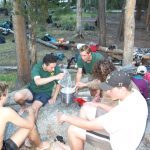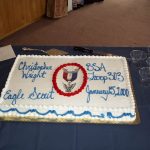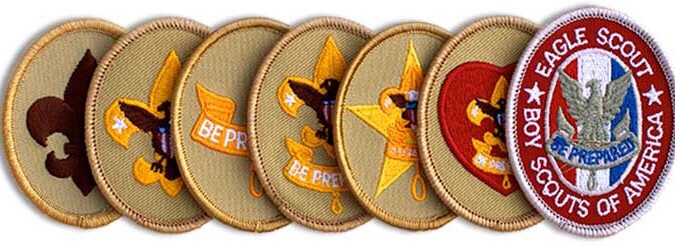The Boy Scouts of America says that of the millions of young men who join, fewer than 2% will complete the arduous tasks required to be accepted as an Eagle Scout, the organization’s highest rank. I was fortunate enough to have both the opportunity and the support to excel in scouting, but there was one question I hadn’t ever prepared for.
 The process to become an Eagle Scout is lengthy, by design. Each of the ranks have lists of requirements, including the knowledge of knot work, hiking and outdoors experience, leadership training, and general good conduct. Dozens of merit badges covering citizenship, environmental protection, first aid, and many other skills all had to be earned individually, some of which took months. Before gaining a new rank, each scout must have all requirements signed off by the adult leaders and pass a “board of review,” where parents and other troop supervisors talk to the boy and ask him about what he has learned.
The process to become an Eagle Scout is lengthy, by design. Each of the ranks have lists of requirements, including the knowledge of knot work, hiking and outdoors experience, leadership training, and general good conduct. Dozens of merit badges covering citizenship, environmental protection, first aid, and many other skills all had to be earned individually, some of which took months. Before gaining a new rank, each scout must have all requirements signed off by the adult leaders and pass a “board of review,” where parents and other troop supervisors talk to the boy and ask him about what he has learned.
Once a Life Scout, the highest rank before Eagle, the real work of putting into practice all of the lessons he had learned to that point come into full view. To apply for the rank of Eagle Scout, which must be done before the candidate’s 18th birthday, they must complete not only a standard list of requirements – such as supporting the troop in a senior leadership position, the aforementioned merit badges, and other tasks and deeds – but also lead a public service project, working with the community and rest of the troop to perform a long-lasting improvement to the area. This project must be meticulously documented and catalogued, and must be of sufficient scale and scope so as to demonstrate commitment, planning, and leadership skills.
At the end of all this, when the binder full of accolades and pictures, testimonials and reports is prepared for review by the national body, preparation begins for the Scout to pass the final test – his Eagle Board of Review. Not composed of a few parents the boy has known for years, instead prominent Eagle Scouts from around the county, all of whom are strangers to the boy, sit in judgment to see whether or not the candidate measure up to the standards they swore to uphold when they themselves were accepted.
Preparation for this major event includes many practice boards of review with local Scout leaders, parents, and other senior troop members, focusing on helping the candidate explain and demonstrate what they have learned through their time in the Boy Scouts and how they live the tenets of the Scout Oath and Law. Every requirement and signature from his very first days in scouting are scrutinized and discussed, so that the candidate can answer any question put to him about his experiences, both growing up in the troop and then in his turn leading it.
I’ll never forget my Eagle Board of Review. I was allowed one reference, someone who would enter the room before me and speak to the board on my behalf. Afterward, he would be silent, offering support only in his presence, nothing more. I chose my Scout Master, who had seen me grow and develop over my entire time in the Boy Scouts. He was silent as he came and got me, and he wouldn’t speak again until we left the board almost 90 minutes later.
When I entered the room I was introduced to an imposing panel of Eagle Scouts, none of whom I had met before. There was a sitting judge, a city councilman, and at least one business owner among others – seven in all. They had my portfolio open in front of them, and they were ready to dissect my time in the organization and gauge my worthiness to be counted among them.
We talked about all aspects of my career in the Boy Scouts, the various summer camps I had visited, and the many lessons I learned both about the world and about myself. They went over my Eagle Service Project in great detail, and I honestly didn’t know whether I was impressing them or not.
At the end of the examination, which at times felt more like an interrogation, I was asked the one question that none of my preparations, mock boards of review, or scouting lessons had prepared me for. The question caught me completely off-guard, even though in retrospect it seems as obvious as daylight that it would be asked:
Why do you want to be an Eagle Scout?
I was actually stunned at the question because it wasn’t one I had ever considered before. I was a driven young man, who had taken the right steps in order to get to that point – why wouldn’t I want to be an Eagle Scout? In my mind, it was the obvious next step, just as applying to college was. Was that really an answer though? Certainly not one that would have left a good impression.
Sometimes moments of genius inspiration strike, whether through luck or random confluence, and the perfect answer to a situation comes to mind. In that moment I had an epiphany, one that truly answered the question not just for the Board sitting across from me but also internally for myself.
“My father was a Boy Scout, my uncle, my grandfather and many before him. They tell me stories of their adventures, of the lessons they learned, of the people they met and the places they saw. They have all of these wonderful stories, but each one ends with the same regretful line: ‘And I was this close to getting my Eagle.’ I never want the wonderful memories and lessons I have from Scouting to be tainted by the idea that I could have been an Eagle Scout, but didn’t go for it.”
The board don’t have any further questions, and it was then, for the first time, that I saw genuine approval on their faces. They signed my paperwork and gave me hearty handshakes. They would recommend to the national board that I be recognized an Eagle Scout.
 Even now, nineteen years later, I remember the moment that realization of why I had put in so much effort, spent so many hours getting those merit badges and learning the handbook backwards and forwards. Late evening making plans to help improve the troop and long weekends hiking into the wilderness. More so than the actual Eagle Scout ceremony, I remember that one moment of having the perfect answer to a question that had never before been a question.
Even now, nineteen years later, I remember the moment that realization of why I had put in so much effort, spent so many hours getting those merit badges and learning the handbook backwards and forwards. Late evening making plans to help improve the troop and long weekends hiking into the wilderness. More so than the actual Eagle Scout ceremony, I remember that one moment of having the perfect answer to a question that had never before been a question.














